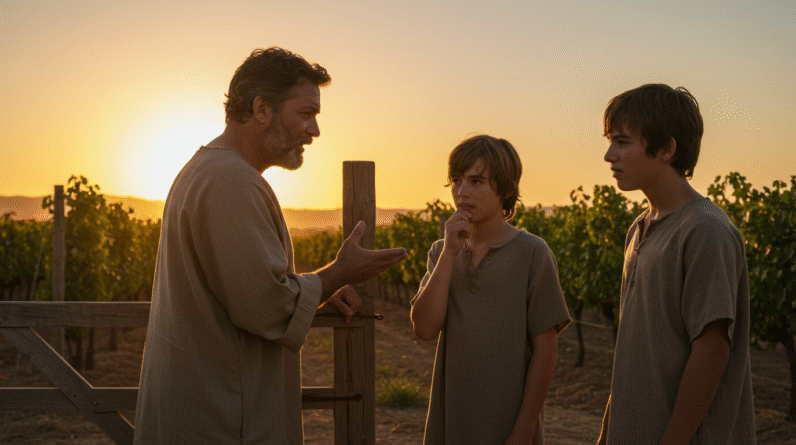The Prodigal Son: A Story of Grace for the Lost
Have you ever found yourself in moments where you feel adrift, possibly even drowning in guilt or shame? We all have phases in life that make us feel distant, unworthy, or just too far gone to believe we could find redemption. One timeless tale narrated by Jesus might just offer you a beacon of hope and a window into the transformative power of grace: the Parable of the Prodigal Son.
Introduction to the Parable: A Journey Begins
The tale, captured eloquently in Luke 15:11-32, succinctly traces the journey of a young man who, lured by the excitement of a world beyond, seeks to claim his inheritance prematurely. Armed with newfound wealth, he ventures far from the familiarity of home, seeking thrills, freedom, and perhaps some form of self-discovery. But beneath this adventure lie lessons deep-rooted in the realities of grace, repentance, and redemption.
The Younger Son: Seeking Freedom Yet Becoming Lost
Every young person has a phase where they long for independence, a yearning usually coupled with adventurous zeal and naiveté. The younger son embodies this phase, carrying dreams and desires far into a distant land. However, life has its way of equalizing things. Euphoria is transient, and the thrill can diminish, often leaving a void.
A Fall from Grace
Depleted of his wealth and riches, he finds himself in dire hardship, working in menial jobs, feeding pigs—a stark contrast from the life he envisioned. It is often when we reach these low points that introspection begins. The young son reflects on his mistakes and the life he once had but took for granted. It’s a narrative that resonates because, at some level, we’ve all made choices that led us astray. Yet, even in moments of despair, there’s a seed of hope.
The Turning Point: Realization and Resolve
Herein lies one of the most important segments of the parable: the young man’s epiphany that leads him on a path to redemption. He comes to the humble realization that even his father’s hired servants live better than he does now. This moment marks the beginning of his return journey, not just physically, but emotionally and spiritually.
Repentance as a Catalyst
Repentance is more than just a feeling of guilt; it’s an active decision to turn back. The young son decides to return to his father, not expecting to be received as a son but willing to be a servant. It’s a significant move from entitlement to humility, a critical step in beginning the restoration process. In life’s journey, recognizing one’s mistakes and opting to make amends is pivotal.

The Father’s Heart: An Unconditional Love
This is where the story transcends the earthly and touches the divine. Upon seeing his son from afar, the father is overwhelmed with compassion. Forgetting norms or societal expectations, he runs to embrace his son, a gesture loaded with unconditional love and grace. For those who feel undeserving, it’s a beautiful image of divine grace awaiting every lost soul.
The Power of Forgiveness
The father’s acceptance shows a profound truth: grace is not earned; it is given. His actions show that one’s worth is not diminished by past errors. It’s a powerful reminder of God’s boundless love, emphasizing that, no matter how far we stray, we are never too far from home. In welcoming the son back with a grand celebration, the father exemplifies joyful restoration, willing to erase prior transgressions for the sake of reconciliation.
The Elder Brother: Resentment in the Face of Grace
Switching perspectives, introduce yourself to the elder brother, who stayed home, worked diligently, and obeyed the rules. When he learns of his brother’s celebration, resentment boils within, revealing another layer of the narrative. His story is equally important because it mirrors feelings of injustice many of us grapple with.
Understanding Resentment
The older brother’s predicament challenges us to examine how we respond to grace received by others. His feelings are relatable when juxtaposed against notions of fairness. Yet, perhaps the deeper lesson lies in understanding that grace isn’t about fairness; it’s abundant, extending generously to all, irrespective of merit.
Compassion Over Comparison
God’s kingdom encourages us to celebrate transformations, not comparisons. The elder brother’s reaction is a cautionary tale, urging us to replace bitterness with empathy, understanding that the joy of one does not diminish the worth of another. Extending grace to others, as the father did, can lead to collective human flourishing.
Themes of the Parable: A Reflection for All
This parable isn’t just a tale from antiquity; it speaks directly to modern life and its challenges. Here are key themes that urge contemplation:
Grace Above All
Grace is freely given, transcending human logic. It is present for both the lost and the found, awaiting anyone willing to embrace it. Whether you identify with the younger son or the older brother, God’s grace is sufficient and ready to transform lives.
The Path to Redemption
Redemption begins with acknowledging one’s state, just like the younger son did. It is underscored by God’s readiness to welcome anyone back into his fold, emphasizing the joy that comes with each returning soul.
The Power of Forgiveness
The father’s willingness to forgive exemplifies love in its purest form. Forgiveness liberates, both for the one who gives it and the one who receives it. Reflecting this virtue in our interactions can mend and build bridges anew.
Call to Action: Welcoming You Home
You might be standing at a crossroad, perhaps still far from home, or maybe in the familiar warmth yet struggling with resentment. This story is an invitation to return, not to a place but to a person—to God, who longs to embrace you despite any distance or wrongs. Take this parable as a reminder that you are never too lost to be found.
As you reflect on your journey, consider these questions: Have you ever felt too far gone to be welcomed back? What does this parable reveal about God’s compassion? How can you extend the same grace to those around you?
Remember, no matter how far you’ve wandered, God is always ready to receive you with open arms. His love remains steadfast and unwavering.

Explore More Bible Insights:
✅ 1. Serving God by Serving Others
Tone: Practical, inspirational, servant-hearted
🔹 “Live Out Your Faith with These Reads”
✅ 2. The Prayer of Jabez – 1 Chronicles 4:10
Tone: Encouraging, bold faith, personal growth
🔹 “Ask Boldly, Live Fully – Keep Reading”
✅ 3. The Promise of Eternal Life – 1 John 2:25
Tone: Reassuring, hope-filled, theological
🔹 “Secure in Christ – Explore More”
✅ 4. Lessons from the Battle of Jericho – Joshua 6
Tone: Obedience, victory through faith, historical insight
🔹 “Victory Through Faith – Read Next”
As a ClickBank Affiliate, I earn from qualifying purchases.
Acknowledgment: All Bible verses referenced in this article were accessed via Bible Gateway (or Bible Hub).
“Want to explore more? Check out our latest post on Why Jesus? and discover the life-changing truth of the Gospel!”







